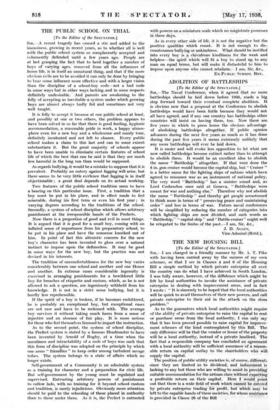THE PUBLIC SCHOOL ON TRIAL [To the Editor of the
SPECTATOR.] SIR,—A recent tragedy has caused a stir and added to the Uneasiness, growing in recent years, as to whether all is well with the public school system so complacently accepted and vehemently defended until a few years ago. People are at last grasping the fact that to herd together a number of boys of varying ages, removed from all the influences of home life, is in itself an unnatural thing, and that if the more obvious evils are to be avoided it can only be done by bringing to bear some influence more effective and with a larger vision than the discipline of a school-boy code—not a bad code in some ways but in other ways lacking, and in some respects definitely undesirable. And parents are awakening to the folly of accepting as inevitable a system under which groWing boys are almost always badly fed and sometimes not very well taught.
It is folly to accept it because at one public school at least, and possibly at one or two others, the problem appears to have been solved in so far that there is good feeding, hygienic accommodation, a reasonable pride in work, a happy atmos- phere even for a new boy and a wholesome and manly tone, definitely inculcated and not left to chance. Every public school makes a claim to this last and can to some extent substantiate it. But the great majority of schools appear to have been unable to eliminate certain features of school life of which the best that can be said is that they are much less harmful in the long run than would be supposed.
As regards bullying, it would be a mistake to suppose that it is prevalent. Probably an outcry against fagging will arise, but there seems to be very little evidence that fagging is in itself objectionable ; a great deal depends on its actual working.
Two features of the public school tradition seem to have
a bearing on this particular issue. First, a tradition that a boy must be put in his place, and in effect made to feel miserable, during his first term or even his first year ; in varying degrees according to the traditions of the school. Secondly, a system of school discipline which allows arbitrary punishment at the irresponsible hands of the Prefects.
Now there is a proportion of good and evil in most things.
It is argued that it is good for a small boy, coining with an inflated sense of importance from his preparatory school, to be put in his place and have the nonsense knocked out of him. In point of fact this altruistic concern for the new boy's character has been invented to gloss over a natural instinct to impose upon the defenceless. It may be good in some ways for the new boy, but the practice was not devised in his interests.
The tradition of uncomfortableness for the new boy varies
considerably between one school and another and one House and another. In extreme cases considerable ingenuity is exercised in arranging punishments for a bewildered little boy for breaches of etiquette and custom, which, as he is not' allowed to ask a question, are ingeniously withheld from his knowledge. It is not in a strict sense bullying, but it is hardly less reprehensible.
If the spirit of a boy is broken, if he becomes embittered, he is probably an exceptional boy, but exceptional cases are not rare and have to be reckoned with. The average boy survives it without taking much harm from a sense of injustice and an absence of fair play. It is more serious for those who feel themselves licensed to impart the instruction.
As to the second point, the system of school discipline, the Prefect system is stated by a famous Headmaster to have been invented by Arnold of Rugby, at a time when the unruliness and intractability of a mob of boys was such that this form of discipline was adopted on the principle by which one arms " friendlies " to keep order among turbulent savage tribes. The system belongs to a state of affairs which no longer exists.
Self-government of a Community is an admirable system as a training for character and a preparation for civic life.
But self-government by the young must be regulated and supervised. Entrusting arbitrary pciwers of punishment to callow lads, with no training for it beyond school custom and tradition, is surely injudicious. Obviously more attention should be paid to the schooling of those placed in authority than to those under them. As it is, the Prefect is entrusted with powers on a miniature scale which no magistrate possesses iriTthese dais.
As in every other side of life, it is not the negative but the positive qualities which count. It is not enough to dis-, countenance bullying or unkindness. What should be instilled
into every boy chivalrous kindliness for . the weak and helpless—the spirit which. will fit a boy to stand up, to any man on equal,terMs, but will make 'it distasteful to .him to
impose upon anyone who cannot retaliate.--I am, Sir, &c.,
Ex-Pinruc SCHOOL BOY.
. .














































 Previous page
Previous page